Property affordability June 2021 update
Australian property market prices continued to climb over the last month, with the past six months seeing some of the strongest growth on record. Mortgage interest rates edged higher as the Reserve Bank of Australia ended its Term Funding Facility. There are some extraordinary divergences in affordability. It has never been cheaper in some markets to service a mortgage, but never more expensive to save for a deposit or pay off the loan.
In general, housing valuation and affordability statistics worsened over June. For investors, rental yields have never been lower in an absolute sense, never higher relative to mortgage rates.
The net effect is that the Federal Government and Reserve Bank have successfully distorted conditions to encourage as many people as possible to borrow as much as possible. An investment in housing is basically a vote of confidence in their ability to keep force-feeding the market.
We run an Australian property market calculator to help investors or potential homeowners determine the returns on Australian property. The idea we want to illustrate is that there are a number of key inputs into housing valuation. Interest rates are the most important, but the other limiting factors are:
- Mortgage Payments to Rent: comparing the cost of a mortgage with the cost of renting the same house. Using this ratio to constrain house prices, we assume that people will prefer to rent when the ratio gets high rather than buy.
- Mortgage Payments to Wages: assuming when the ratio gets high, people rent because they cannot afford to buy.
- Property Prices to Wages: assuming when the ratio gets high, people rent because they cannot save enough money to afford a deposit. We treat this as less important than the above two ratios.
- Rental Yield: Rental yield is the annual rent divided by the property price. By using this ratio to forecast prices, you are assuming when the ratio gets low investors will not buy property as they are not getting a return that is high enough.
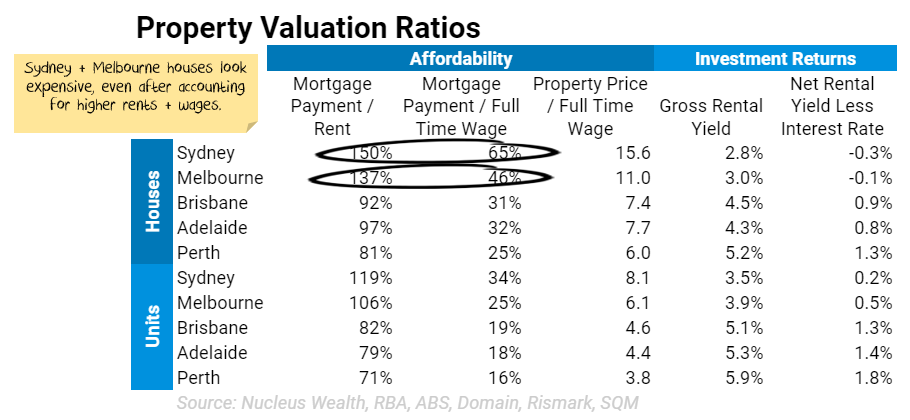
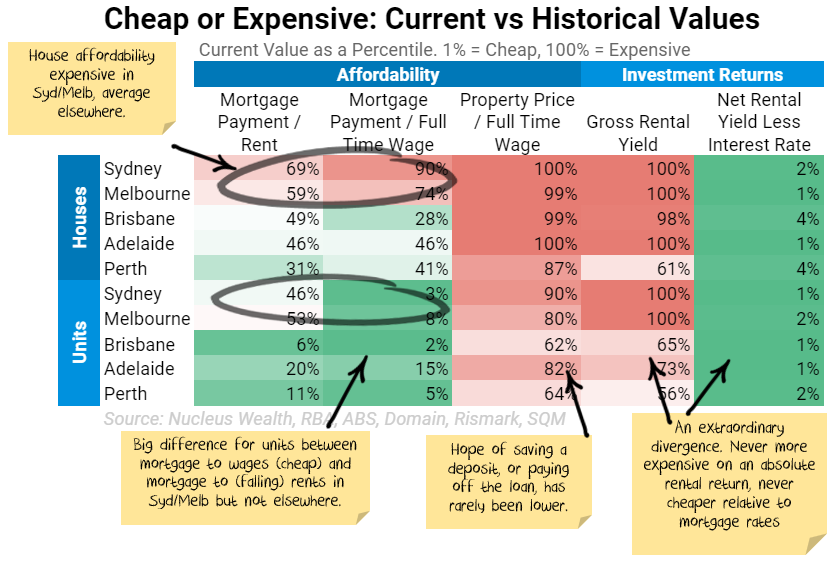
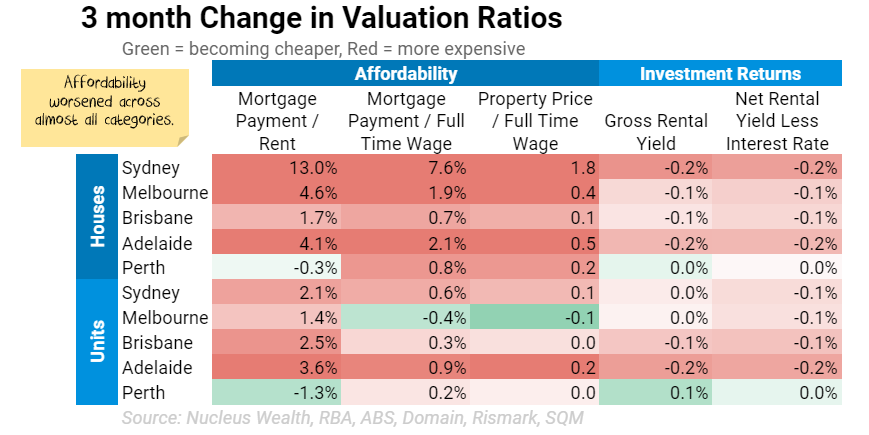
Australian mortgage rates can go lower but look like rising first.
This is the confusing part. There are effectively two different interest rates at the moment, the floating rate and the three-year fixed rate.
- The floating rate is determined mainly based on the Reserve Bank of Australia. It reduced the floating rate to 0.1% in March 2020, which reduced the standard variable rate from banks to around 4.5%. This is unlikely to change.
- In March 2020, the Reserve Bank also introduced a facility where they lent directly to the banks at 0.1% for three years. This facility (and other market interventions) allowed banks to drop three-year fixed mortgages to around 2%. Its name is the Term Funding Facility. It ended at the end of June.
We note the European Central Bank introduced the same mechanism in 2014 and has never been able to remove it. It started with 0.1% funding for banks in 2014. By 2016 the rate was around 0.4% and is now around 1%. Yes, the central bank will pay commercial banks up to 1% if they can just find someone (anyone!!!) to borrow the money.
When you adjust the factors in our property market calculator, you find that with low inflation, wage growth and rent growth that interest rates become even more important for determining property prices. But forget about the cash rate. The important factor is the Term Funding Facility. At the moment, the Reserve Bank is planning on removing this facility in June. Interest rates have already risen slightly, and it seems likely the removal will likely see the three-year rate continue to rise.
Macro factors
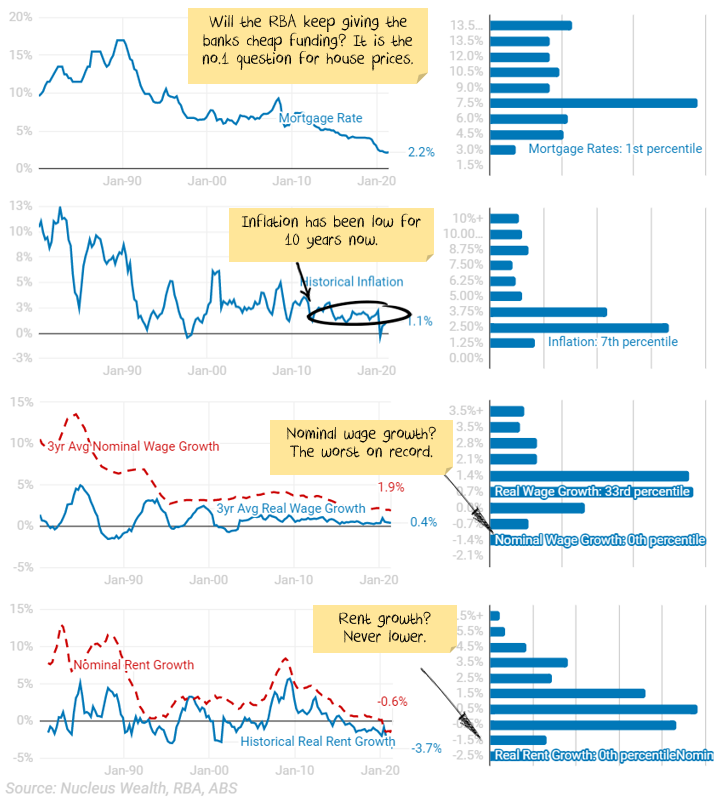
What does this do to residential property valuations?
Keep in mind that I'm talking about forecasting residential property in aggregate – not individual houses or suburbs.
There are significant links between property prices and the availability of debt. The financial crisis showed this internationally. The Royal Commission into banking showed this in Australia. When the amount of debt available rises, so do property values. When debt slows down, property values fall.
Credit growth is at extremely high levels. Credit availability is not a problem.
At one end of the spectrum is Sydney houses. They are now looking expensive on affordability measures:
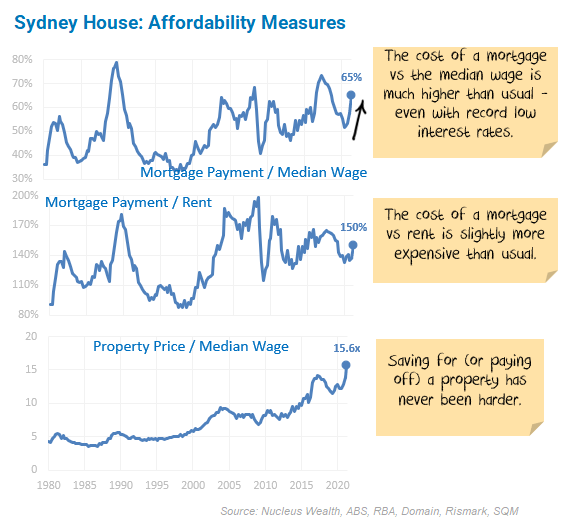
At the other end of the spectrum is Brisbane units, still looking more affordable than any other major city:
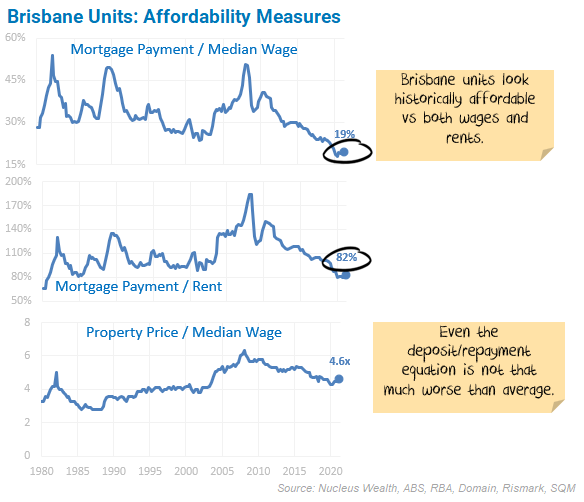
For the above charts for other Australian locations see the property detail. For more on how and why we use these ratios see our residential real estate forecasting methodology.
Australian property market outlook
It is a fascinating showdown.
On the one hand, plummeting immigration, pandemic disruptions and the end of eviction/mortgage payment moratoriums aren't helping. A boost in supply is in progress, spurred by new home building. Rental growth is showing vague signs of life, but is close to as weak as it has ever been. And Australia starts with a larger private debt burden than just about any other country.
On the other, we have a burning political desire to keep Australian property market prices high and pump more debt into the economy. Inflation is low, as is wage growth, meaning interest rates can stay lower for longer. We have a roadmap to much lower interest rates to help. There is a structurally higher demand for houses vs units due to the fear of more lockdowns.
Australia is stuck in a debt trap. We’ve got so much debt we can’t raise rates because it makes it more difficult for people to pay back debt. To get more growth we have to cut rates, so people borrow more and the cycle goes on.
The best hope for change? Mass New Deal-style work schemes push up earnings and growth comes from real spending power instead of debt. But that is a long way away.
In the meantime, there are other ways to keep the property party going. Once mortgages were for 20 years, then 25, now 30. Soon it will be 50. Japan has 100 year mortgages. Many people will never pay their mortgage back, so owning a home might become like renting – just that it’s renting from the bank.
Not an existing Livewire subscriber?
If you're not an existing Livewire subscriber you can sign up to get free access to investment ideas and strategies from Australia's leading investors.
And you can follow my profile to stay up to date with other wires as they're published – don't forget to give them a “like”.
Sources:
Nucleus Wealth has compiled this data using a range of different sources.
We use Domain for more recent data quarterly property prices and rents, cross-checked with SQM to fill any short-term moves. Older information is from Rismark and the Australian Bureau of Statistics to fill time series.
For economic data, we use either Reserve Bank of Australia or Australia Bureau of Statistics data. For older data, we have had to estimate some factors due to differing definitions over time.
1 contributor mentioned

